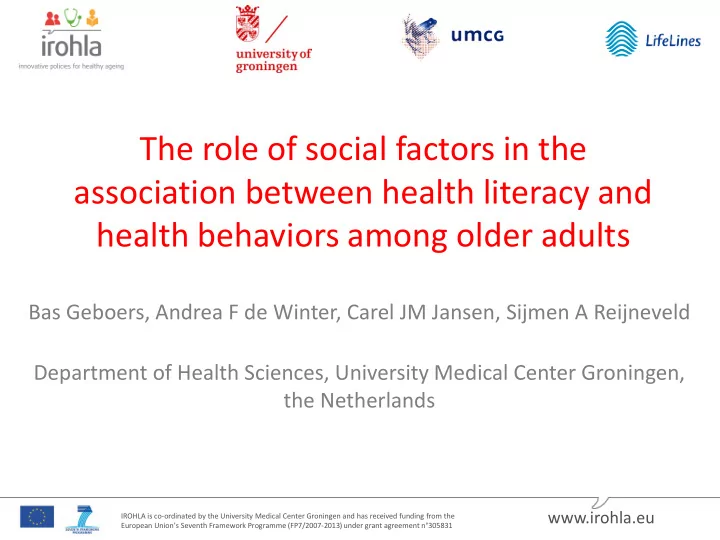

The role of social factors in the association between health literacy and health behaviors among older adults Bas Geboers, Andrea F de Winter, Carel JM Jansen, Sijmen A Reijneveld Department of Health Sciences, University Medical Center Groningen, the Netherlands www.irohla.eu IROHLA is co-ordinated by the University Medical Center Groningen and has received funding from the European Union’s Seventh Framework Programme (FP7/2007-2013) under grant agreement n°305831
Background • Low health literacy is associated with various negative health outcomes among older adults. • This may partially be explained by associations between health literacy and general health behaviors. • Social factors (e.g. loneliness, social support, social contacts) might moderate these associations. www.irohla.eu IROHLA is co-ordinated by the University Medical Center Groningen and has received funding from the European Union ’ s Seventh Framework Programme (FP7/2007-2013) under grant agreement n°305831
Objectives 1 2 www.irohla.eu IROHLA is co-ordinated by the University Medical Center Groningen and has received funding from the European Union’s Seventh Framework Programme (FP7/2007-2013) under grant agreement n°305831
Methods (1) • This study: • LifeLines is a Dutch prospective population based cohort study (n=167,729). Data collected in three waves (so far). • Data of 3,241 participants were used (51.4% male, mean baseline age = 68.9 years). • Data collection: Health literacy, health behaviors, social factors www.irohla.eu IROHLA is co-ordinated by the University Medical Center Groningen and has received funding from the European Union ’ s Seventh Framework Programme (FP7/2007-2013) under grant agreement n°305831
Methods (2) Health behaviors Social factors Physical activity Loneliness Fruit consumption Social support Vegetable consumption Engaging in social activities Smoking behavior Having many social contacts Breakfast habits Living alone Alcohol use BMI www.irohla.eu IROHLA is co-ordinated by the University Medical Center Groningen and has received funding from the European Union’s Seventh Framework Programme (FP7/2007-2013) under grant agreement n°305831
Methods (3) • Health literacy measured by three validated questions (Chew, 2004). Added up to a 3-15 scale, dichotomized to high (13 or higher, 66.6%) vs. low (34%). • Health behaviors assessed with self-report questions and dichotomized based on international standards. • Social factors measured with various self-report measures. • Logistic regression used, adjusted for age and sex. Interaction effects were assessed to study potential moderation. www.irohla.eu IROHLA is co-ordinated by the University Medical Center Groningen and has received funding from the European Union’s Seventh Framework Programme (FP7/2007-2013) under grant agreement n°305831
Results (1) • Low health literacy was associated with low physical activity, low fruit and vegetable consumption, poor breakfast habits, and more obesity (OR’s>1.31, p -values<.003) • Health literacy was positively associated with alcohol use (OR=0.81, p=.013). • No association between health literacy and smoking behavior was found (p=.26). www.irohla.eu IROHLA is co-ordinated by the University Medical Center Groningen and has received funding from the European Union’s Seventh Framework Programme (FP7/2007-2013) under grant agreement n°305831
Results (2) • Association between health literacy and smoking was significantly moderated by number of social contacts (p<.05). • Many contacts: Low HL -> More smoking (OR=1.38, p=.055) Few contacts: Low HL -> Less smoking (OR=0.35, p=.068) • 34 other tested moderations were not significant. www.irohla.eu IROHLA is co-ordinated by the University Medical Center Groningen and has received funding from the European Union’s Seventh Framework Programme (FP7/2007-2013) under grant agreement n°305831
Conclusion & Implications • Low health literacy is associated with a range of unhealthy behaviors among older adults. This may partially explain the association between low health literacy and poor health outcomes in this group. • The negative impacts of health literacy on health behaviors are mostly not restricted to lonely people and neither buffered by social participation. www.irohla.eu IROHLA is co-ordinated by the University Medical Center Groningen and has received funding from the European Union’s Seventh Framework Programme (FP7/2007-2013) under grant agreement n°305831
Credits for pictures: -Wikipedia, Chalmers Butterfield -Mount Pleasant Granary -Flickr.com, Jane Fresco and Lewis Hine -Wikimedia Commons, Bill Branson www.irohla.eu IROHLA is co-ordinated by the University Medical Center Groningen and has received funding from the European Union’s Seventh Framework Programme (FP7/2007-2013) under grant agreement n°305831
Recommend
More recommend